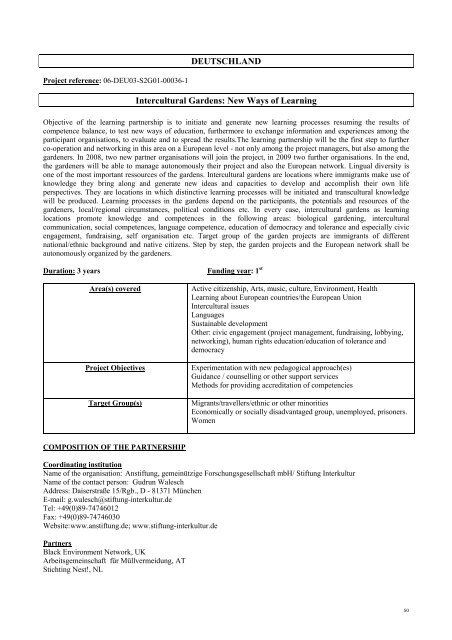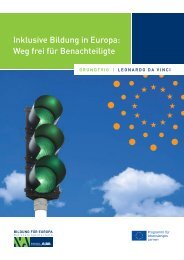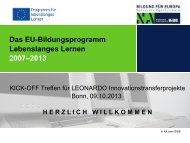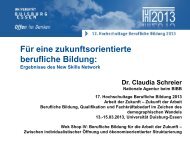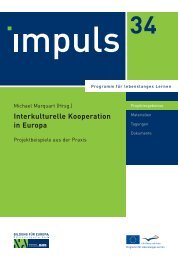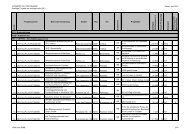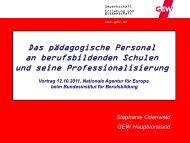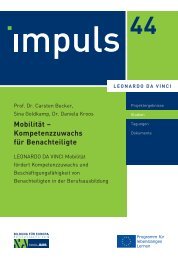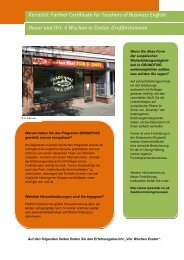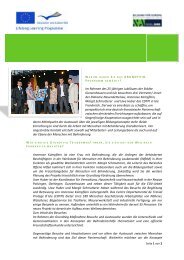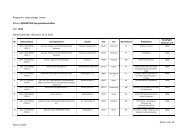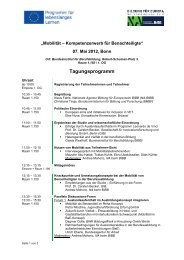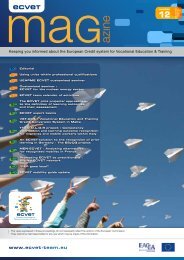- Page 1 and 2:
EUROPEAN COMMISSION JANUARY 2007 CO
- Page 3 and 4:
TABLE OF CONTENTS BELGIUM (FLEMISH
- Page 5 and 6:
PULSE - Perceptions and Understandi
- Page 7 and 8:
Culture and Language to Promote Cit
- Page 9 and 10:
Interval ..........................
- Page 11 and 12:
FRESH START - Engaging marginalised
- Page 13 and 14:
MOOSE - Models Of Sustainibility Ed
- Page 15 and 16: Get the Message - SMS - Specific Ma
- Page 17 and 18: A NEW APPROACH TO THE TEACHER-PAREN
- Page 19 and 20: Project reference: BELGIË European
- Page 21 and 22: Project reference: V/0306/co/89-200
- Page 23 and 24: Project reference: BELGIË TELL ME
- Page 25 and 26: Project reference: V/0306/CO/R2/058
- Page 27 and 28: Project reference: 06-BEF01-S2G01-0
- Page 29 and 30: Project reference: 06-CZE01-S2G01-0
- Page 31 and 32: Project reference: 06-CZE01-S2G01-0
- Page 33 and 34: Project reference: 06-CZE01-S2G01-0
- Page 35 and 36: DENMARK Project reference: 06-DNK01
- Page 37 and 38: Project reference: 06-DNK01-S2G01-0
- Page 39 and 40: Project reference: 06-DNK01-S2G01-0
- Page 41 and 42: Project reference: 06-DNK01-S2G01-0
- Page 43 and 44: Project reference: 06-DNK01-S2G01-0
- Page 45 and 46: Project reference: 06-DNK01-S2G01-0
- Page 47 and 48: Project reference: 06-DNK01-S2G01-0
- Page 49 and 50: Project reference: 06-DEU03-S2G01-0
- Page 51 and 52: Project reference: 06-DEU03-S2G01-0
- Page 53 and 54: Project reference: 06-DEU03-S2G01-0
- Page 55 and 56: Project reference: 06-DEU03-S2G01-0
- Page 57 and 58: Project reference: 06-DEU03-S2G01-0
- Page 59 and 60: Project reference: 06-DEU03-S2G01-0
- Page 61 and 62: Project reference: 06-DEU03-S2G01-0
- Page 63 and 64: Project reference: 06-DEU03-S2G01-0
- Page 65: Project reference: 06-DEU03-S2G01-0
- Page 69 and 70: Project reference: 06-DEU03-S2G01-0
- Page 71 and 72: Project reference: 06-DEU03-S2G01-0
- Page 73 and 74: Project reference: 06-DEU03-S2G01-0
- Page 75 and 76: Project reference: 06-DEU03-S2G01-0
- Page 77 and 78: Project reference: 06-DEU03-S2G01-0
- Page 79 and 80: Project reference: 06-DEU03-S2G01-0
- Page 81 and 82: Project reference: 06-DEU03-S2G01-0
- Page 83 and 84: Project reference: 06-DEU03-S2G01-0
- Page 85 and 86: Project reference: 06-DEU03-S2G01-0
- Page 87 and 88: Project reference: 06-DEU03-S2G01-0
- Page 89 and 90: Project reference: 06-DEU03-S2G01-0
- Page 91 and 92: Project reference: 06-DEU03-S2G01-0
- Page 93 and 94: Project reference: 06-DEU03-S2G01-0
- Page 95 and 96: Project reference: 06-DEU03-S2G01-0
- Page 97 and 98: Project reference: 06-DEU03-S2G01-0
- Page 99 and 100: Project reference: 06-DEU03-S2G01-0
- Page 101 and 102: Project reference: 06-DEU03-S2G01-0
- Page 103 and 104: Project reference: 06-DEU03-S2G01-0
- Page 105 and 106: Project reference: 06-DEU03 - S2G01
- Page 107 and 108: Project reference: 06-DEU03-S2G01-0
- Page 109 and 110: Project reference: 06-DEU03-S2G01-0
- Page 111 and 112: Project reference: 06-DEU03-S2G01-0
- Page 113 and 114: Project reference: 06-DEU03-S2G01-0
- Page 115 and 116: Project reference: 06-EST01-S2G01-0
- Page 117 and 118:
Project reference: 06-EST01-S2G01-0
- Page 119 and 120:
Project reference: 06-EST01-S2G01-0
- Page 121 and 122:
IRELAND Project reference: 06-IRL01
- Page 123 and 124:
Project reference: 06-IRL01-S2G01-0
- Page 125 and 126:
Project reference: 06-IRL01-S2G01-0
- Page 127 and 128:
Project reference: 06-IRL01-S2G01-0
- Page 129 and 130:
Project reference: 06-IRL01-S2G01-0
- Page 131 and 132:
Project reference: 06-GRC01-S2G01-0
- Page 133 and 134:
Project reference: 06- GRC01-S2G01-
- Page 135 and 136:
SPAIN Project Reference: 06-ESP01-S
- Page 137 and 138:
Project Reference: 06-ESP01-S2G01-0
- Page 139 and 140:
Project Reference: 06-ESP01-S2G01-0
- Page 141 and 142:
Project Reference: 06-ESP01-S2G01-0
- Page 143 and 144:
Project Reference: 06-ESP01-S2G01-0
- Page 145 and 146:
Project Reference: 06-ESP01-S2G01-0
- Page 147 and 148:
Project Reference: 06-ESP01-S2G01-0
- Page 149 and 150:
Project Reference: 06-ESP01-S2G01-0
- Page 151 and 152:
Project Reference: 06-ESP01-S2G01-0
- Page 153 and 154:
Project Reference: 06-ESP01-S2G01-0
- Page 155 and 156:
Project Reference: 06-ESP01-S2G01-0
- Page 157 and 158:
Project Reference: 06-ESP01-S2G01-0
- Page 159 and 160:
Project Reference: 06-ESP01-S2G01-0
- Page 161 and 162:
Project Reference: 06-ESP01-S2G01-0
- Page 163 and 164:
Project Reference: 06-ESP01-S2G01-0
- Page 165 and 166:
Project Reference: 6-ESP01-S2G01-00
- Page 167 and 168:
Project Reference: 06-ESP01-S2G01-0
- Page 169 and 170:
Project Reference: 06-ESP01-S2G01-0
- Page 171 and 172:
Project Reference: 06-ESP01-S2G01-0
- Page 173 and 174:
FRANCE Project reference: 06-FRA1-S
- Page 175 and 176:
Project reference: 06-FRA1-S2G01-00
- Page 177 and 178:
Project reference: 06-FRA1-S2G01-00
- Page 179 and 180:
Project reference: 06-FRA1-S2G01-00
- Page 181 and 182:
Project reference: 06-FRA1-S2G01-00
- Page 183 and 184:
Project reference: 06-FRA1-S2G01-00
- Page 185 and 186:
Project reference: 06-FRA1-S2G01-00
- Page 187 and 188:
Project reference: 06-FRA1-S2G01-57
- Page 189 and 190:
Project reference: 06-FRA1-S2G01-00
- Page 191 and 192:
Project reference: 06-FRA1-S2G01-00
- Page 193 and 194:
Project reference: 06-FRA1-S2G01-00
- Page 195 and 196:
Project reference: 06-FRA1-S2G01-00
- Page 197 and 198:
Project reference: 06-FRA1-S2G01-00
- Page 199 and 200:
Project reference: 06-FRA1-S2G01-00
- Page 201 and 202:
Project reference: 06-FRA1-S2G01-00
- Page 203 and 204:
Project reference: 06-FRA1-S2G01-00
- Page 205 and 206:
Project reference: 06-FRA1-S2G01-00
- Page 207 and 208:
Project reference: 06-FRA1-S2G01-00
- Page 209 and 210:
Project reference: 06-FRA1-S2G01-00
- Page 211 and 212:
ITALY Project Reference: 06-ITA01-S
- Page 213 and 214:
Project reference: 06-ITA01-S2G01-0
- Page 215 and 216:
Project reference: 06-ITA01-S2G01-0
- Page 217 and 218:
Project reference: 06-ITA01-S2G01-0
- Page 219 and 220:
Project reference: 06-ITA01-S2G01-0
- Page 221 and 222:
Project reference: 06-ITA01-S2G01-0
- Page 223 and 224:
Project reference: 06-ITA01-S2G01-0
- Page 225 and 226:
Project reference: 06-ITA01-S2G01-0
- Page 227 and 228:
Project reference: 06-ITA01-S2G01-0
- Page 229 and 230:
Project reference: 06-ITA01-S2G01-0
- Page 231 and 232:
Project Reference: 06-ITA01-S2G01-0
- Page 233 and 234:
Project reference: 06-ITA01-S2G01-0
- Page 235 and 236:
Project reference: 06-ITA01-S2G01-0
- Page 237 and 238:
Project reference: 06-ITA01-S2G01-0
- Page 239 and 240:
Project reference: 06 - LVA01 - S2G
- Page 241 and 242:
Project reference: 06-LVA01-S2G01-0
- Page 243 and 244:
Project reference: 06-LVAO1-S2G01-0
- Page 245 and 246:
LITHUANIA Project reference: 06-LTU
- Page 247 and 248:
Project reference: 06-LTU01-S2G01-0
- Page 249 and 250:
Project reference: 06-LTU01-S2G01-0
- Page 251 and 252:
Project reference: 06-LTU01-S2G01-0
- Page 253 and 254:
Project reference: 06-LTU01-S2G01-0
- Page 255 and 256:
Project reference: 06-LTU01-S2G01-0
- Page 257 and 258:
Project reference: 06-LTU01-S2G01-0
- Page 259 and 260:
Project reference: 06-LTU01-S2G01-0
- Page 261 and 262:
Project reference: GR2-2006-62 MAGY
- Page 263 and 264:
Project reference: MAGYARORSZAG “
- Page 265 and 266:
Project reference: GR2-2006-RE-22 M
- Page 267 and 268:
Project reference: MALTA REACHING O
- Page 269 and 270:
Project reference: MALTA C’YOU -
- Page 271 and 272:
Project reference: MALTA PHOENIX: P
- Page 273 and 274:
Project reference: 06-NLD02-S2G01-0
- Page 275 and 276:
Project reference: 06-NLD02-S2G01-0
- Page 277 and 278:
AUSTRIA ÖSTERREICH Project referen
- Page 279 and 280:
ÖSTERREICH Project reference: G2-0
- Page 281 and 282:
ÖSTERREICH Project reference: G2-0
- Page 283 and 284:
ÖSTERREICH Project reference: G2-0
- Page 285 and 286:
ÖSTERREICH Project reference: G2-0
- Page 287 and 288:
ÖSTERREICH Project reference: G2-0
- Page 289 and 290:
ÖSTERREICH Project reference: G2-0
- Page 291 and 292:
ÖSTERREICH Project reference: G2-0
- Page 293 and 294:
ÖSTERREICH Project reference: G2-0
- Page 295 and 296:
ÖSTERREICH Project reference: G2-0
- Page 297 and 298:
ÖSTERREICH Project reference: G2-0
- Page 299 and 300:
POLAND Project reference: 06-POL01-
- Page 301 and 302:
Project reference: 06-POL01-S2G01-0
- Page 303 and 304:
Project reference: 06-POL01-S2G01-0
- Page 305 and 306:
Project reference: 06-POL01-S2G01-0
- Page 307 and 308:
Project reference: 06-POL01-S2G01-0
- Page 309 and 310:
Project reference: 06-POL01-S2G01-0
- Page 311 and 312:
Project reference: 06-POL01-S2G01-0
- Page 313 and 314:
PORTUGAL Project Reference: 06-PRT0
- Page 315 and 316:
Project Reference: 06-PRT01-S2G01-0
- Page 317 and 318:
Project Reference: 06-PRT01-S2G01-0
- Page 319 and 320:
SLOVENIA SLOVENIJA Project referenc
- Page 321 and 322:
SLOVAK REPUBLIC Project Reference:
- Page 323 and 324:
Project Reference: 06-SVK01-S2G01-0
- Page 325 and 326:
Project Reference: 06-SVK01-S2G01-0
- Page 327 and 328:
Project Reference: 06-SVK01-S2G01-0
- Page 329 and 330:
Project reference: 06-FIN01-S2G01-0
- Page 331 and 332:
Project reference: 06-FIN01-S2G01-0
- Page 333 and 334:
Project reference: 06-FIN01-S2G01-0
- Page 335 and 336:
Project reference: 06-FIN01-S2G01-0
- Page 337 and 338:
SWEDEN Project reference: 06-SWE01-
- Page 339 and 340:
Project reference: 06-SWE01-S2G01-0
- Page 341 and 342:
Project reference: 06-SWE01-S2G01-0
- Page 343 and 344:
Project reference: 06-SWE01-S2G01-0
- Page 345 and 346:
Project reference: 06-SWE01-S2G01-0
- Page 347 and 348:
Project reference: 06-GBR01-S2G01-0
- Page 349 and 350:
Project reference: 06-GBR01-S2G01-0
- Page 351 and 352:
Project reference: 06-GBR01-S2G01-0
- Page 353 and 354:
Project reference: 06-GBR01-S2G01-0
- Page 355 and 356:
Project reference: 06-GBR01-S2G01-0
- Page 357 and 358:
Project reference: 06-GBR01-S2G01-0
- Page 359 and 360:
Project reference: 06-GBR01-S2G01-0
- Page 361 and 362:
Project reference: 06-GBR01-S2G01-0
- Page 363 and 364:
Project reference: 06-GBR01-S2G01-0
- Page 365 and 366:
Project reference: 06-GBR01-S2G01-0
- Page 367 and 368:
Project reference: 06-GBR01-S2G01-0
- Page 369 and 370:
Project reference: 06-GBR01-S2G01-0
- Page 371 and 372:
Project reference: 06-GBR01-S2G01-0
- Page 373 and 374:
Project reference: 06-GBR01-S2G01-0
- Page 375 and 376:
Project reference: 06-GBR01-S2G01-0
- Page 377 and 378:
Project reference: 06-GBR01-S2G01-0
- Page 379 and 380:
NORWAY Project reference: 06-NOR01-
- Page 381 and 382:
Project reference: 06-NOR01-S2G01-0
- Page 383 and 384:
BULGARIA Project reference: 06-BGR0
- Page 385 and 386:
Project reference: 06-BGR-01-S2G01-
- Page 387 and 388:
Project reference: 06-G2-92-BN-RO-C
- Page 389 and 390:
Project reference: 06-G2-4-DJ-RO-C-
- Page 391 and 392:
Project reference: 06-G2-44-B-RO-CR
- Page 393 and 394:
Project reference: 06-G2-67-B-RO-C
- Page 395 and 396:
Project reference: 06-G2--86-B-RO-C
- Page 397 and 398:
Project reference: 06-G2-241-DJ-RO-
- Page 399 and 400:
Project reference: 06-G2-159-MM-RO-
- Page 401 and 402:
Project reference: 06-G2-212-DJ-RO-
- Page 403 and 404:
Project reference: 06-TUR01-S2G01-0
- Page 405 and 406:
Project reference: 06-TUR01-S2G01-0
- Page 407 and 408:
Project reference: 06-TUR01-S2G01-0
- Page 409 and 410:
Project reference: 06-TUR01-S2G01-0
- Page 411 and 412:
Project reference: 06-TUR01-S2G01-0
- Page 413 and 414:
Basic skills 2, 3, 4, 5, 7; 9, 10,
- Page 415 and 416:
145, 146, 147, 149, 151, 154, 156,
- Page 417 and 418:
Migrants /Immigrants/ethnic or othe


